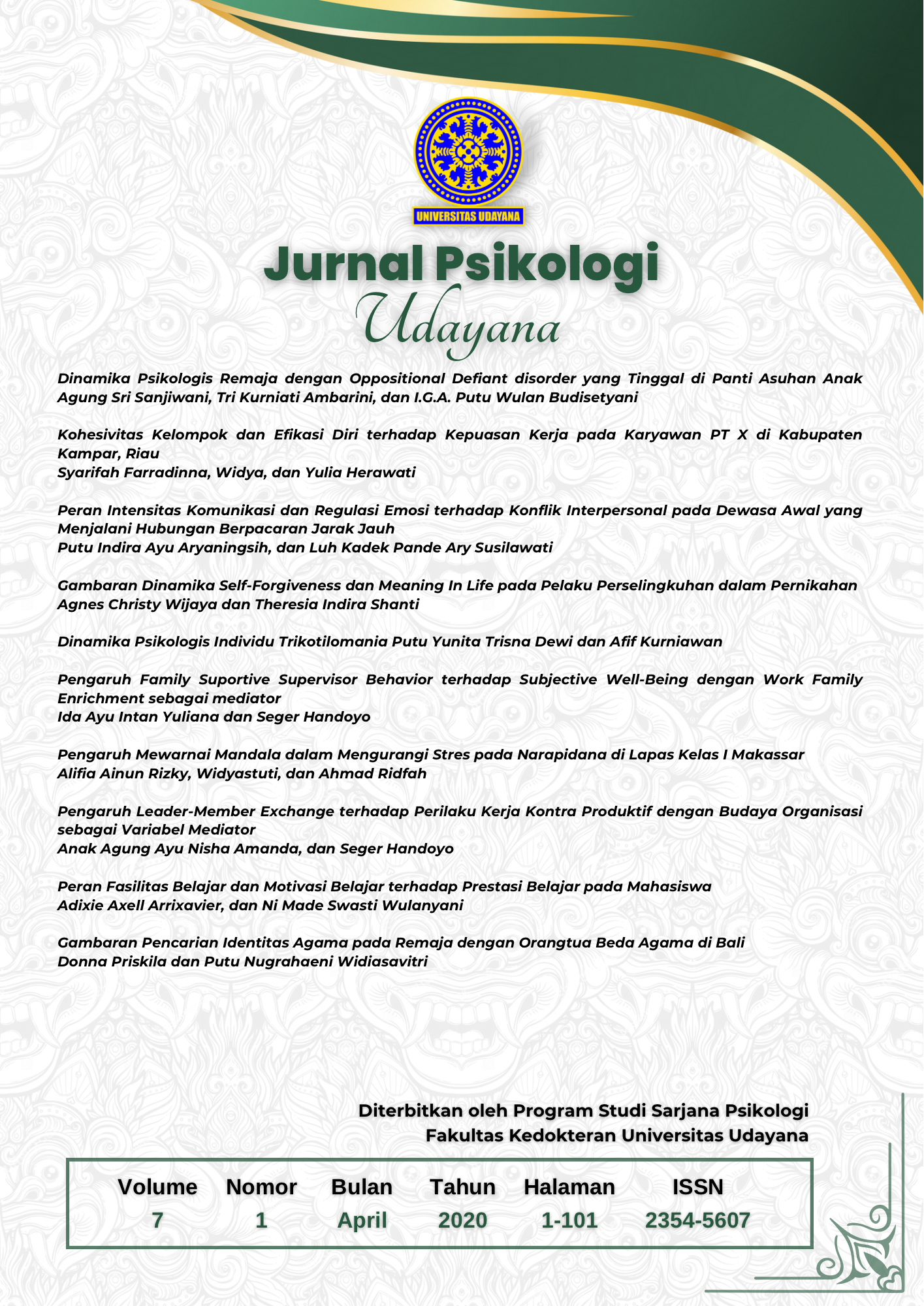Dinamika psikologis remaja dengan oppositional defiant disorder yang tinggal panti asuhan
Abstract
Oppositional defiant disorder (ODD) atau gangguan perilaku menentang merupakan salah satu permasalahan yang sering terjadi pada remaja. Remaja yang tinggal di panti asuhan dapat menjadi rentan terhadap permasalahan perilaku yang terkait dengan penyesuaian lingkungan, aturan dan teman-teman baru. Penelitian ini bertujuan untuk menggali lebih lanjut mengenai permasalahan perilaku, diagnosis serta dinamika psikologis dari perilaku menentang yang ditampilkan oleh KPS. Subjek dalam penelitian ini berjumlah satu orang yang merupakan remaja putri berusia 14 tahun. Teknik pengambilan data yang dilakukan terdiri dari wawancara semi terstruktur, observasi serta rangkaian tes psikologi mencakup tes grafis (DAP, BAUM & HTP), Children Behavior Checklist (CBCL), Forer’s Sentence Completion Test (FSCT) dan Weschler Intelligence Scale for Children (WISC). Hasil menunjukkan bahwa KPS memenuhi kriteria gangguan perilaku menentang (ODD) berdasarkan DSM-IV TR. Faktor-faktor terkait perilaku kasar dari ibu kandung dan perpindahan pengasuhan pada beberapa pihak mendasari kesulitan KPS untuk mengembangkan rasa aman dalam hubungannya sehingga ditunjukkan dalam perilaku tidak adaptif. Hal ini kemudian mempengaruhi terbentuknya insecure attachment pada KPS yang kemudian membuat KPS menentang figur otoritasnya, sering marah dan menyalahkan orang lain.
Downloads
References
American Psychiatric Association. (2013). Diagnostic and statistical manual of mental disorder:DSM-5 (5th Ed.). Washington DC: Publisher.
Beauchaine, T. P., & Hinshaw, S. P. (2013). Child and adolescent psychopathology (2nd Ed.). New Jersey: John Wiley & Sons, Inc.
Burnette, M. L. (2013). Gender and the development of oppositional defiant disorder: Contributions of early family environment. Child Maltreatment, 1–10.
Carr, A. (2016). The handbook of child and adolescent clinical psychology : a contextual approach (3rd Ed.). New York: Routledge.
Comer, R. J. (2010). Abnormal Psychology (7th Ed). New York: Worth Publishers.
Davies, D., & Bhugra, D. (2004). Models of psychopatology. USA: Open University Press.
Dawson, A. E., Allen, J. P., Marston, E. G., Hafen, C. A., & Schad, M. M. (2014). Adolescent insecure attachment as a predictor of maladaptive coping and externalizing behavior in emerging adulthood. Attachment Human Development, 16(5).
Gresman, F. M. (2015). Disruptive behavior disorder: Evidence-based practice for assesment and intervention. New York: The Guildford Press.
Holmes, J. (2014). John bowlby and attachment theory (2nd Ed.). New York: Routledge.
Kinney, C., & Renk, K. (2007). Emerging research and theory in the etiology of oppositional defiant disorder: Current concern and future directions. International Journal of Behavioral Consultation and Therapy, 3(3).
Lochman, J. E., & Matthys, W. (2018). The wiley handbook of disruptive and impulsive-control disorder. USA: John Wiley & Sons, Inc.
Mansoer, W. W. (2019). Attachment to significant figures, resilience and delinquency among adolescents in orphanages in jakarta. Advances in Social Science, Education and Humanities Research, 229, 164–178.
Megawati, P., Lestari, S., & Lestari, R. (2019). Gratitude training to improve subjective well-being among adolescent living in orphanages. Humanitas Indonesian Psychological Journal, 16(1), 13–22.
Mohammadi, M. M., & Poursaberi, R. (2018). The Effects of Stress‑coping Strategies and life skills trainings on the mental health and academic progress of adolescent cancer patients: A quasi‑experimental Study. Nurs Midwefery Stud, 7, 12–17.
Mohammazadeh, M., Awang, H., Ismail, S., & Shahar, H. K. (2019). Improving emotional health and self-esteem of Malaysian adolescents living in orphanages through Life Skills Education program: A multi-centre randomized control trial. PLoS ONE, 1–18.
Neuman, W. L. (2014). Social Research Methods: Qualitative and Quantitative Approach (Seventh Ed). Edinburgh: Pearson Education Limited.
Sadock, B. J., & Sadock, V. A. (2017). Kaplan & sadock’s concise textbook of clinical psychiatry (4th Ed.). Philadelphia: Wolters Kluwer.
Theule, J., Germain, S. M., Cheung, K., Hurl, K. E., & Markel, C. (2016). Conduct disorder/oppositional defiant disorder and attachment: A meta-analysis. J Dev Life Course Criminology.
Wilmshurst, L. (2015). Essentials of child and adolescent psychopathology (2nd Ed.). New Jersey: Wiley & Sons, Inc.

This work is licensed under a Creative Commons Attribution-ShareAlike 4.0 International License.
Authors who publish with this journal agree to the following terms:
- Authors retain copyright and grant the journal right of first publication with the work simultaneously licensed under a Creative Commons Attribution-ShareAlike 4.0 International License that allows others to share the work with an acknowledgement of the works authorship and initial publication in this journal.
- Authors are able to enter into separate, additional contractual arrangements for the non-exclusive distribution of the journals published version of the work (e.g., post it to an institutional repository or publish it in a book), with an acknowledgement of its initial publication in this journal.
- Authors are permitted and encouraged to post their work online (e.g., in institutional repositories or on their website) prior to and during the submission process, as it can lead to productive exchanges, as well as earlier and greater citation of published work (See The Effect of Open Access).













